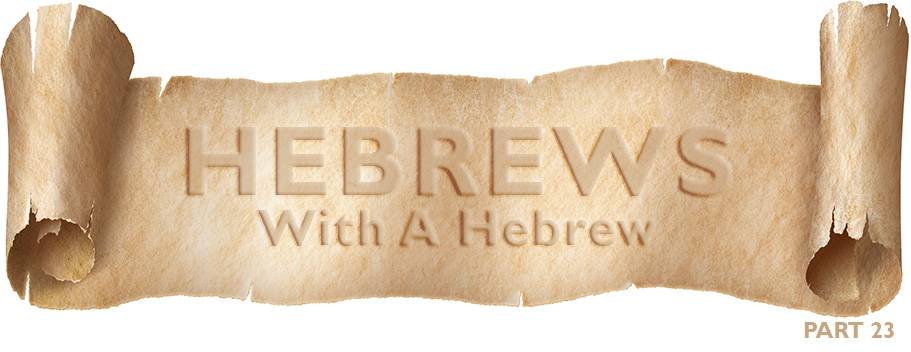We Have Need of Endurance
For if we go on sinning deliberately after receiving the knowledge of the truth, there no longer remains a sacrifice for sins, but a fearful expectation of judgment, and a fury of fire that will consume the adversaries. Anyone who has set aside the law of Moses dies without mercy on the evidence of two or three witnesses. How much worse punishment, do you think, will be deserved by the one who has trampled underfoot the Son of God, and has profaned the blood of the covenant by which he was sanctified, and has outraged the Spirit of grace? For we know him who said,“Vengeance is mine; I will repay.” And again, “The Lord will judge his people.” It is a fearful thing to fall into the hands of the living God.
But recall the former days when, after you were enlightened, you endured a hard struggle with sufferings, sometimes being publicly exposed to reproach and affliction, and sometimes being partners with those so treated. For you had compassion on those in prison, and you joyfully accepted the plundering of your property, since you knew that you yourselves had a better possession and an abiding one. Therefore, do not throw away your confidence, which has a great reward. For you have need of endurance, so that when you have done the will of God, you may receive what is promised.
For, “Yet a little while,
and the coming one will come and will not delay;
but my righteous one shall live by faith,
and if he shrinks back,
my soul has no pleasure in him.”
But we are not of those who shrink back and are destroyed, but of those who have faith and preserve their souls.
Heb. 10:26-39
This is another one of those paragraphs that, unless rightly understood, sends shivers down our spines. It seems to suggest that if a person sins willfully after becoming a believer, they cannot be forgiven, even if they repent afterward. But in truth, it is a particular type of sin that the writer views here—namely, the sin of unbelief or, more specifically, the sin of apostasy. These are those who have denied the faith after previously believing (“Here, however, the reference is to those who move from open belief to open unbelief, who, having professed Christ as Savior and Lord, now turn their back on that profession and repudiate Christ’s once-for-all sacrifice” (A Commentary on the Epistle to the Hebrews, Philip Edgcumbe Hughes, page 419).
The writer reminds his readers of the penalty that was paid for setting aside the Law of Moses—persons died without mercy as long as there were two or three witnesses to his having repudiated the Old Covenant. But the writer says, “How much worse punishment, do you think, will be deserved by the one who has trampled underfoot the Son of God, and has profaned the blood of the covenant by which he was sanctified, and has outraged the Spirit of grace? For we know him who said, “Vengeance is mine; I will repay.” And again, ‘The Lord will judge his people.” It is a fearful thing to fall into the hands of the living God” (Hebrews 10:29-31). This is what the sin consisted of; a rejection of the covenant. If this was the penalty for setting aside the Old Covenant, how much more severe will the judgment be for those who reject the New Covenant.
This is followed by a reminder of the sufferings these Hebrew believers had already endured for their faith. Some were publicly humiliated while others had their earthly possessions plundered. Their attitude towards their sufferings demonstrated the confidence of faith they had in the Gospel. The writer encourages them not to throw away their confidence which has great reward (10:35). For these things they have suffered have been the means of their developing endurance, a quality that is of the utmost importance if they are to make it in the long haul. The Greek word is hupomone, which carries the idea of staying or being unmovable. The writer says, “For you have need of endurance, so that when you have done the will of God you may receive what is promised” (10:37).
Is that the way you view your sufferings and difficulties, that they are training you to develop endurance? This quality of endurance is indispensable if we are to receive what is promised. The writer of Hebrews then quotes the second chapter of the book of Habakuk, verse 4, to introduce the importance of faith. But it’s not merely faith that is in view, but enduring faith that is the focus of the following chapter known as the Great Hall of Faith. In this chapter, we will begin to examine this great list of those who endured through faith.





0 Comments